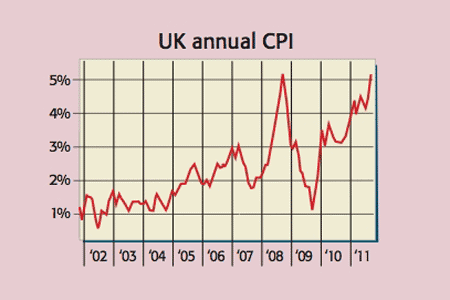Get the latest financial news, insights and expert analysis from our award-winning MoneyWeek team, to help you understand what really matters when it comes to your finances.
You are now subscribed
Your newsletter sign-up was successful
Want to add more newsletters?

Twice daily
MoneyWeek
Get the latest financial news, insights and expert analysis from our award-winning MoneyWeek team, to help you understand what really matters when it comes to your finances.

Four times a week
Look After My Bills
Sign up to our free money-saving newsletter, filled with the latest news and expert advice to help you find the best tips and deals for managing your bills. Start saving today!
Inflation jumped to 5.2% in September, up from 4.5% in August, due largely to a surge in gas and electricity bills. The annual change in the Consumer Price Index (CPI) has matched the rate seen in September 2008, the highest level since the index was introduced in 1997. Underlying inflation, or core CPI, which strips out food and energy prices, remains historically high, climbing to 3.3%. The broader Retail Price Index, which includes mortgage costs, is at a 20-year high of 5.6%. The Bank of England (BoE) expects inflation to subside next year as the rise in VAT drops out of the annual comparison and energy prices stabilise.
What the commentators said
This isn't just bad news for individuals and the economy as a whole as a squeeze on real incomes undermines spending it's also a problem for the public finances, said Buttonwood on Economist.com. Benefits and pension payments are based on the September figure. The budget forecasts were calculated with an inflation rate of 4.3%, according to the Institute for Public Policy Research. So the government could have to spend up to £1.2bn more than it thought more than the fall in the budget deficit in the first five months of the year. "It is hard work getting that deficit down."
The BoE and various pundits insist that inflation is a blip caused by one-off factors, said Nick Cohen on Spectator.co.uk. Yet this "blip" has lasted for three years now "and shows no sign of emitting its last, dying bleep". CPI has been above the 2% target for so long that it looks as though the Bank "has given up on inflation control", said John Kemp on Reuters.com.
MoneyWeek
Subscribe to MoneyWeek today and get your first six magazine issues absolutely FREE

Sign up to Money Morning
Don't miss the latest investment and personal finances news, market analysis, plus money-saving tips with our free twice-daily newsletter
Don't miss the latest investment and personal finances news, market analysis, plus money-saving tips with our free twice-daily newsletter

Fluctuating commodity prices aside, the worrying thing is that underlying inflation is so high. Despite the weak economy "there is much more pricing power in the economy than the Bank anticipated", said Kemp. Many sectors, such as grocery retailing, housebuilding and energy supply, seem to be "oligopolies dominated by a small number of big firms". In other industries, such as public utilities, the government has guaranteed above-inflation price rises to spur investment. We have a "structural inflation problem".
All the quantitative easing, or money printing, by the Bank is also storing up trouble. It means inflation could soar once demand returns and money starts moving around the economy quickly again, said WSJ.com. The Bank is sure to be behind the curve when it comes to dampening price pressures because "central banks always are". And by the time it gets its act together, the current committee members "will be enjoying the comforts of an index-linked retirement". It took years to banish the "ghost of Britain's post-war inflationary past", said Jeremy Warner on Telegraph.co.uk. Our hard-won credibility as a low-inflation state "is in danger of being thrown away".
Get the latest financial news, insights and expert analysis from our award-winning MoneyWeek team, to help you understand what really matters when it comes to your finances.
MoneyWeek is written by a team of experienced and award-winning journalists, plus expert columnists. As well as daily digital news and features, MoneyWeek also publishes a weekly magazine, covering investing and personal finance. From share tips, pensions, gold to practical investment tips - we provide a round-up to help you make money and keep it.
-
 Should you buy an active ETF?
Should you buy an active ETF?ETFs are often mischaracterised as passive products, but they can be a convenient way to add active management to your portfolio
-
 Power up your pension before 5 April – easy ways to save before the tax year end
Power up your pension before 5 April – easy ways to save before the tax year endWith the end of the tax year looming, pension savers currently have a window to review and maximise what’s going into their retirement funds – we look at how

